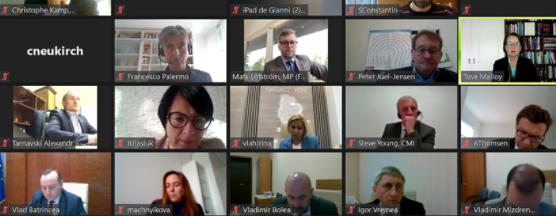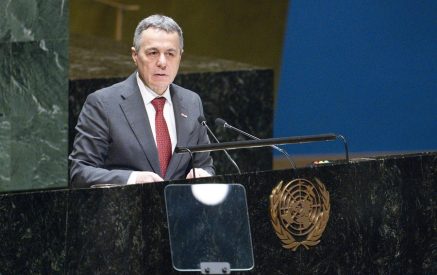COPENHAGEN, 29 September 2020 – Balanced integration policies, supported by carefully negotiated forms of territorial autonomy, are key to preventing the risks, crises and conflicts possibly resulting from the increasing diversity within our societies, participants heard today at an online forum initiated and hosted by the Office of the OSCE High Commissioner on National Minorities. Focused specifically on the Moldovan experience with regional autonomy, the event was co-hosted with the OSCE Parliamentary Assembly and the Moldovan Parliament, and was addressed by PA President George Tsereteli (Georgia).
The high-level dialogue, entitled “Functioning Autonomy as a Strategy for Inclusive Governance: International Practice and Moldovan Experience,” also featured participation by OSCE PA Treasurer and Head of the Danish Delegation Peter Juel-Jensen, who spoke about Greenland’s model of working autonomy, as well as other members of parliament.
Emphasizing the importance of well-equipped local institutions, President Tsereteli said in his opening remarks that decentralization in itself is not the solution to build more resilient regions. “While it is important to leave room for local initiatives, the key is to promote a continuous dialogue between national and subnational authorities to ensure better coordination and effective responses,” Tsereteli said.
He underlined the need to use all available tools to prevent, mediate, and peacefully resolve conflicts. “The High Commissioner on National Minorities is one of these instruments,” Tsereteli said. “Over the past quarter century, the High Commissioner’s tireless efforts have prevented more than one conflict from boiling over by assisting participating States to de-escalate inter-ethnic tensions.”
Read also
Juel-Jensen noted that questions of autonomy are always complicated and stressed that to be successful, autonomy must be based on mutual respect and understanding. He provided an overview of the relationship between Greenland and Denmark, noting that after centuries as a colony, Greenland has had self-government since 1979. Greenlanders control local administration, including questions of taxation, environmental protection and management of natural resources. Denmark consults Greenland closely on military and security policy, and provides vital economic support, he said.
Also offering a parliamentary perspective at the event were MP Mats Löfström, who represents the autonomous Aaland Islands in the Finnish Parliament, and several Moldovan parliamentarians, including Speaker Zinaida Greceanii and Deputy Speaker Vlad Batrîncea, as well as members of the Moldovan PA delegation.
Former OSCE High Commissioner on National Minorities and current OSCE PA consultant Lamberto Zannier addressed the opening session and moderated session two, focused on creating political conditions for functioning Gagauz autonomy in Moldova. Ambassador Zannier highlighted in his remarks the importance of investing in education to create conditions to facilitate integration while preserving cultural identity.
The event was moderated by Christophe Kamp, Director and Officer-in-Charge, Office of the OSCE High Commissioner on National Minorities. Other speakers included Gianni Buquicchio, President of the Venice Commission, Council of Europe; and Claus Neukirch, Head of the OSCE Mission to Moldova.
OSCE Parliamentary Assembly























































